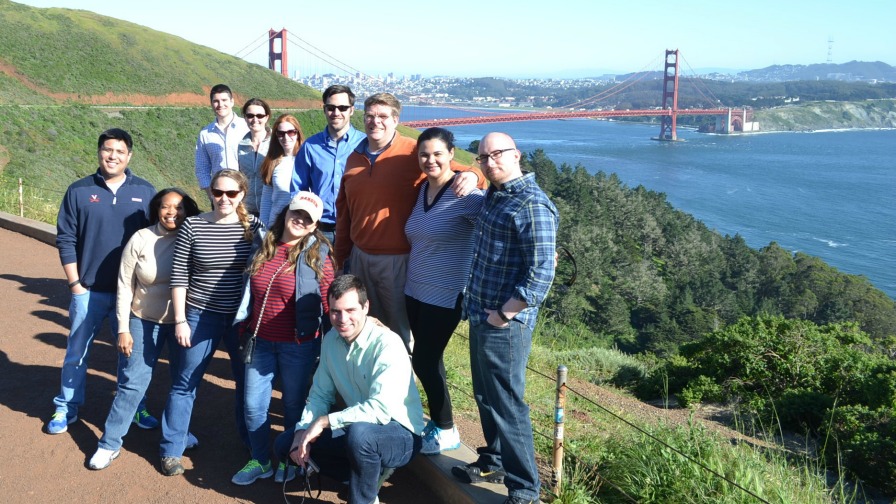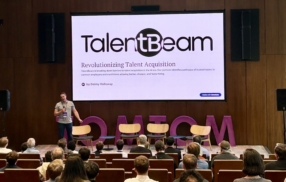
UVA Darden Students Get Close-up Look at Culture, Mission and Disruption in Silicon Valley
By Jay Hodgkins
A 15-feet-tall mural depicting a popular meme of a 16-bit video game character on the wall of Tesla’s headquarters announced: “All our patent are belong to you [sic].” Just across from a well-stocked bar, hip-hop blared out of a speaker that looked more like a painting in the chic office that serves as the home of early stage venture capital firm BlueRun Ventures. A ukulele player crooned classic Hawaiian hits on the park-like roof of Facebook’s newest office building while employees played tug-of-war.
Business in Silicon Valley is unique, something that must be experienced to be understood. That is exactly why the University of Virginia Darden School of Business Global MBA for Executives (GEMBA) Class of 2016 traveled to the San Francisco Bay Area from 11–15 April, as students were immersed in a week of courses and on-site company visits.
After global residencies in Brazil, China, Western Europe and India, the experience in Silicon Valley served as the start of the cohort’s final two-week residency — the last demonstration of the power of the GEMBA format to provide an immersive, impactful learning experience.
“I couldn’t have imagined learning so much without the immersion,” said Dr. Gerelyn Henry, a forensic pathologist and member of the Class of 2016. “To experience the locations, understand the culture in the context of what we were learning and to connect all the pieces to Darden content really works well to provide an invaluable education experience.”
The Bay Area residency included visits to companies like Tesla, BlueRun, Rocket Fuel and Facebook, where students were hosted by Matt Wurster (GEMBA ’15). In addition, the GEMBAs spent time with executives from Netflix, Deloitte and more, while Professors Martin Davidson and Raj Venkatesan joined Professor Yiorgos Allayannis, academic director of GEMBA, in delivering course curriculum focused on innovation, technology and leading strategic change.
Rocket Fuel Gives Lesson on Future of Marketing
Abhishek Kumar (MBA ’14) hosted the GEMBA visit to Rocket Fuel, where the cohort learned how “programmatic marketing” is disrupting the entire field of marketing by changing it from a craft of art to one of data science.
Noting the rapid move of advertising spend into online digital platforms, Rocket Fuel’s Roland Siebelink, head of quality and efficiency at the company, argued that programmatic marketing is the future of marketing because it uses the vast amount of data produced by consumers’ online activities to predict the best opportunity to deliver an ad “to just the right person in just the right place at just the right time.”
There’s an old saying among marketers that “50 percent of my advertising is a waste; I just don’t know which 50 percent,” Siebelink said. But programmatic marketing eliminates the waste via data that is organized into predictive analytics.
With this marketing revolution firmly underway, Siebelink warned that conventional chief marketing officers with an “art school” background are under pressure. He advised the GEMBAs to become well versed in data science if they want to join the next generation of CMOs.
Simon Hayhurst, senior vice president of product and business, shared what Rocket Fuel looks for in job candidates. He said the company succeeds in recruiting employees because it offers a powerful story about how working there has a real purpose and will advance a career.
Rocket Fuel successfully retains employees because it hires people who want to learn. “If you want to earn more on Monday, this may not be the place for you. If you want to earn more in the long term, then stay because you’ll learn more here,” Hayhurst said.
Into the Shark Tank With Darden Venture Capitalists
Venture capital firm BlueRun Ventures turned into a mini-reunion for the Class of 1993 when the GEMBAs came to visit. Jackie Glynn (MBA ’93), managing director at Glynn Capital Management, and Sean Foote (MBA ’93), venture partner at Labrador Ventures, joined BlueRun General Partner Jonathan Ebinger (MBA ’93) at his office to sit on a Shark Tank-like panel evaluating pitches made by the students.
In many cases, the students were pitching products or services they had dreamed up for GEMBA projects months earlier and that they are now considering pursuing as entrepreneurs after graduation.
One such startup is xLab Ventures, which a team of 2016 GEMBA students led by David Maruna and Prashant Lamba pitched as an online acceleration lab for military veterans and their family members pursuing startups. The xLab team included students who served in the Army, Navy and Air Force.
When Ebinger pressured the team to explain why their incubator could thrive without providing desirable physical space for its startups, Air Force reservist Jaime Flood (Class of 2016) noted that active duty military can’t leave their jobs, but an online accelerator would allow military entrepreneurs to start advancing their startups before their terms of service were complete. “We know from being in their shoes — or boots,” she said.
Class of 2016 students Rob Albritton and Tom Hastain also plan on growing their venture, LavaThreads, which they pitched as a retail business providing products like bags and clothing made almost entirely from basalt lava rock. The basalt rock is melted and fabricated into fibers that are all natural; resistant to water, fire and ultraviolet radiation; lightweight; and extremely durable.
“It’s 66 percent cheaper than Gore-Tex. It’s also lighter and stronger,” Hastain said during his pitch. “And it’s cool. Who gets to wear lava?”
As the panel of VCs passed around a sample handbag, Ebinger said the idea might do well on the real Shark Tank television show. Foote even asked to buy one of the bags.
However, the sharks still took a bite out of the pitch. Ebinger asked why they would want to make retail products out of the basalt fibers and compete with retail giants like Nike. Instead, he and Foote urged the team to lock down patents related to the application and process for the fabric, then sell it wholesale to those retail giants, who can make any sort of branded retail product they want.
Ebinger, Glynn and Foote wrapped up the session by offering the GEMBAs general advice on how to success in the competitive world of startups and venture capital.
Foote advised them to know who they were pitching. While an angel investor might want to hear a visionary “idea pitch,” a venture capitalist wants a “business pitch” that demonstrates how an investment will pay off. He also said securing a venture capital investment is like a job interview — there’s no strict formula for how to get a job, but it’s imperative to come prepared to impress in all facets and keep the door open as long as it takes to secure a winning outcome.
Glynn discussed the importance of business plans. Often derided as old fashioned, Glynn stressed how a plan can help founders truly understand all of the challenges and opportunities ahead.
The lessons each of them provided were not so different than those a finance professor might share in a classroom. However, as designed through the GEMBA experiential curriculum, such lessons echo louder from the mouths of successful members of the Darden network within the walls of Silicon Valley’s top companies.
The University of Virginia Darden School of Business prepares responsible global leaders through unparalleled transformational learning experiences. Darden’s graduate degree programs (MBA, MSBA and Ph.D.) and Executive Education & Lifelong Learning programs offered by the Darden School Foundation set the stage for a lifetime of career advancement and impact. Darden’s top-ranked faculty, renowned for teaching excellence, inspires and shapes modern business leadership worldwide through research, thought leadership and business publishing. Darden has Grounds in Charlottesville, Virginia, and the Washington, D.C., area and a global community that includes 18,000 alumni in 90 countries. Darden was established in 1955 at the University of Virginia, a top public university founded by Thomas Jefferson in 1819 in Charlottesville, Virginia.
Press Contact
Molly Mitchell
Senior Associate Director, Editorial and Media Relations
Darden School of Business
University of Virginia
MitchellM@darden.virginia.edu





